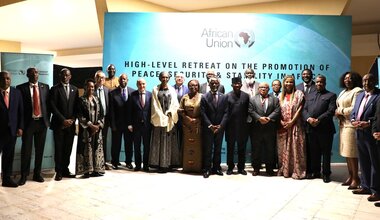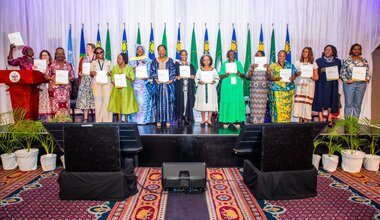Op-Ed | Namibia Leads the Way: Honouring 25 Years of Women, Peace and Security | Elizabeth Eilor
By Elizabeth Eilor, Senior Gender Advisor, United Nations Office to the African Union (UNOAU), Addis Ababa, Ethiopia. This op-ed was originally published in The Namibian on October 25, 2025 and has been reproduced for wider reach.
Last week, the streets of Windhoek came alive with the sound of drums and brass as a marching band led a procession of women from Namibia’s defence and security forces. Dressed in uniform and walking in unity, they marched not only in celebration but in remembrance of a promise made twenty-five years ago—when the world adopted United Nations Security Council Resolution 1325 on Women, Peace and Security.
Resolution 1325 transformed how the world views women’s roles in peacebuilding, conflict prevention, and recovery. It affirmed a truth too long overlooked: that peace is neither sustainable nor just when half of society is excluded from decision-making. It placed women at the centre of efforts to prevent conflict, rebuild nations, and safeguard human rights.
It is fitting that Namibia hosts this silver-anniversary commemoration. Twenty-five years ago, the country made history by presiding over the Security Council that adopted the landmark resolution. Since then, Namibia has continued to turn words into action—integrating gender perspectives into national security policies, ensuring women’s participation in peacekeeping, and promoting women’s leadership from the grassroots to the highest levels of government. The country’s record speaks for itself: a female President, a female Speaker of Parliament, and one of the world’s most gender-balanced Cabinets.
Namibia was also among the first African nations to adopt a National Action Plan on Women, Peace and Security, and it continues to shape the regional agenda through the Southern African Development Community and the African Union. Its progress demonstrates that when political will aligns with gender equality, transformation follows.
The anniversary, held under the theme “Honouring the Legacy, Advancing the WPS Agenda,” has brought together women from across the continent. From the vibrant street procession to consultative dialogues with civil society and youth, every moment has reflected a shared conviction—that women’s participation is essential to building lasting peace.
For the United Nations Office to the African Union, this milestone carries deep meaning. UNOAU works hand-in-hand with the African Union Commission to strengthen women’s roles across peace processes, governance reforms, and mediation efforts. Through our joint initiative, She Stands for Peace, we honour African women who have transformed their communities through courage, innovation, and leadership. The third edition of the book—launched here in Windhoek—profiles these remarkable changemakers whose stories remind us that peace grows stronger when women lead.
As we mark twenty-five years of progress, the United Nations reaffirms its commitment to advancing the Women, Peace and Security agenda. The promise of Resolution 1325 remains as urgent today as it was in 2000: to ensure that women are not only protected from conflict but empowered to prevent and resolve it.
Namibia’s journey stands as an inspiration to Africa and the world. Its legacy reminds us that the spirit of 1325 lives not in resolutions alone, but in the actions of nations that choose to make peace inclusive and enduring. It lives in every woman who chooses dialogue over division and leadership over silence. As we look to the next twenty-five years, may every nation follow Namibia’s example—proving once again that when women lead, peace endures.
 UN
UN






